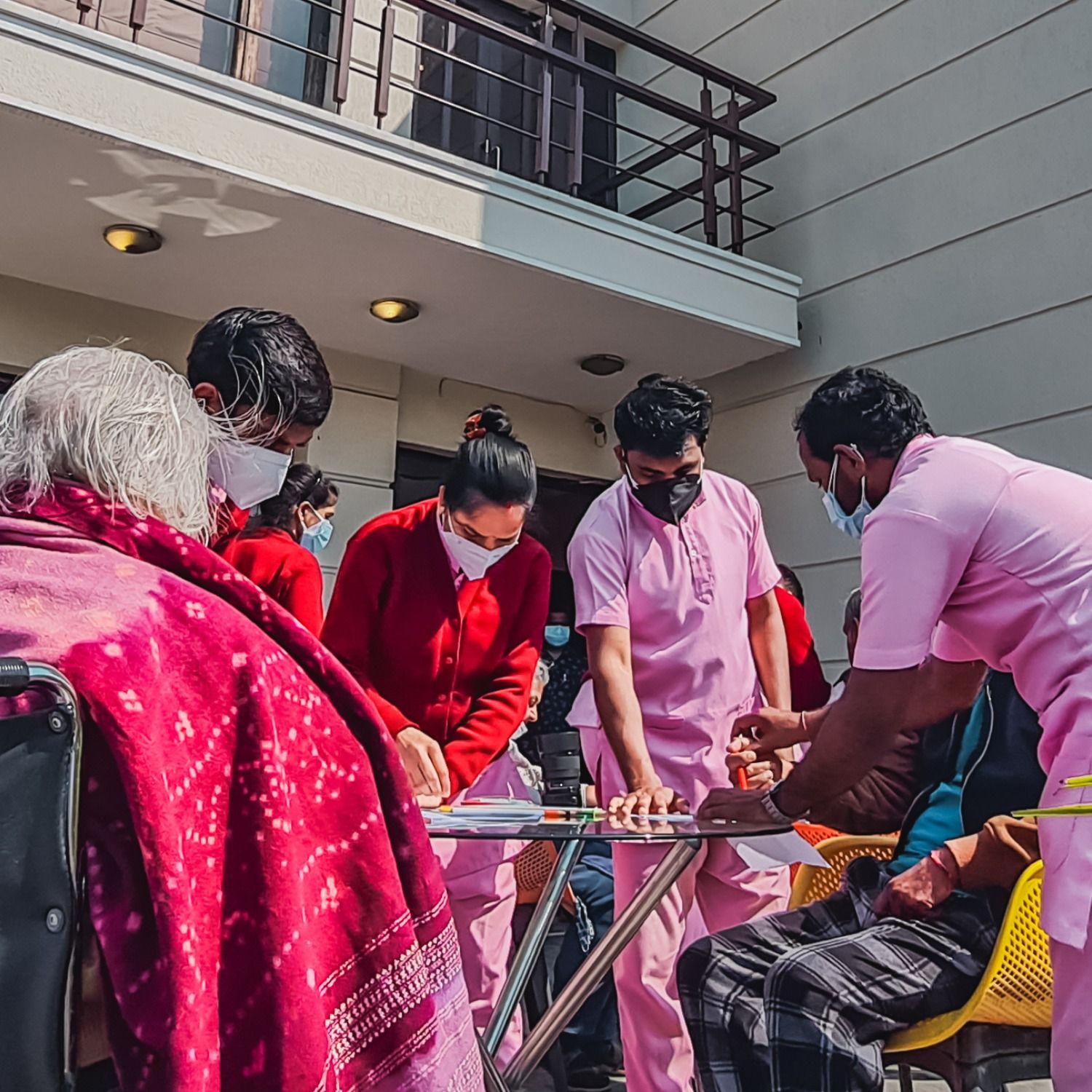Understanding Dementia: More Than Just Ageing
Ageing is a completely natural process that may be accompanied by subtle changes in memory, speed, and cognition. Forgetting where you placed your glasses or occasionally struggling to recall a name is normal. Signs of dementia, however, are not a part of normal ageing. Dementia is termed a progressive neurological condition that affects memory, reasoning, language, and the ability to perform daily activities.
Unlike the mild forgetfulness of ageing, dementia disrupts life in profound ways, altering personality, behaviour, and independence. Alzheimer’s disease is the most common form, but there are others, such as vascular dementia, Lewy body dementia, and frontotemporal dementia. Although each type presents differently, all require specialised, continuous care that adapts as the condition progresses.
Understanding this difference is crucial because while ageing can be supported by family and occasional assistance, dementia needs structured clinical oversight, trained caregivers, and environments specifically designed to provide safety and dignity.
What Kind of Care is Needed for Dementia?
Caring for someone with dementia involves far more than attending to their physical health. It requires a 360-degree approach that balances medical, emotional, psychological, and environmental needs. At its core, dementia care involves:
- Clinical Oversight: Regular monitoring by healthcare professionals to manage symptoms, medications, and co-morbidities like hypertension or diabetes.
- Personalised Daily Assistance: Support for daily activities such as eating, bathing, dressing, and mobility; done with empathy and respect.
- Cognitive and Emotional Engagement: Activities that stimulate memory and social connection, while reducing anxiety or agitation.
- Environmental Design: Spaces with pattern-recognition cues, calming colours, safety features, and accessible layouts that reduce confusion and promote independence.
- Continuity of Routine: Predictable schedules that offer comfort through familiarity and help reduce behavioural symptoms.
Such care cannot be generalized. It must be tailored, and that’s where dementia specialists play an indispensable role.
Who Are Dementia Specialists?
Dementia specialists are trained professionals, often clinicians, psychologists, or senior caregivers, who possess expertise in the medical, behavioural, and psychosocial aspects of dementia. Their role extends beyond diagnosis and treatment; they are the link between the elder’s clinical needs, emotional well-being, and the caregiving team’s training and preparedness.
They bring together a nuanced understanding of how dementia manifests differently in each individual and how the environment and care strategies must evolve.
The Role of Dementia Specialists in Long-Term Care Facilities
Long-term care facilities, especially those like Epoch Elder Care homes, are designed to offer holistic, residential support to elders who need 24/7 care. Within these settings, dementia specialists ensure that care delivery is not just routine but responsive and evidence-based. Their roles include:
-
Clinical Assessment and Monitoring
Dementia specialists regularly assess residents’ cognitive and physical health, monitor disease progression, and collaborate with doctors and therapists to modify care plans. Early recognition of changes, such as increased confusion or withdrawal, allows timely intervention and prevents crises.
-
Training and Supporting Care Teams
They play a critical role in training caregivers to recognise subtle behavioural cues, respond calmly to agitation, and communicate effectively. This ongoing capacity-building ensures that every caregiver can deliver empathetic, informed care, not just mechanical assistance.
Dementia often comes with mood swings, aggression, or anxiety triggered by confusion or fear. Specialists help design non-pharmacological interventions through validation therapy, redirection, sensory engagement, and gentle communication to reduce distress and promote calm.
-
Family Counselling and Support
Families often struggle to understand the trajectory of dementia or feel guilt about placing loved ones in care. Dementia specialists bridge this gap by educating families about the condition, providing emotional support, and involving them in care decisions, thus maintaining a sense of connection and trust.
-
Coordinating Multidisciplinary Care
From doctors and nurses to physiotherapists, psychologists, and nutritionists, dementia specialists ensure seamless coordination among all professionals involved in an elder’s care. This holistic collaboration prevents fragmented treatment and ensures that every intervention aligns with the elder’s overall well-being.
Creating Dementia-Sensitive Environments
One of the most overlooked aspects of dementia care is the environment. Specialists work closely with facility designers and managers to create dementia-friendly spaces that support orientation, safety, and calm.
These include:
- Clearly defined pathways and gentle lighting to reduce confusion.
- Colour cues and familiar layouts that encourage independence.
- Quiet zones and sensory areas for relaxation.
- Secure outdoor spaces for safe movement and connection with nature.
A thoughtfully designed environment, combined with personalised care, allows elders to live with dignity, rather than feeling confined or dependent.
The Role of Emotional and Social Engagement
Dementia specialists understand that quality of life depends not just on medical management, but also on emotional enrichment. Engagement activities are curated to match the resident’s cognitive level and personal interests: art therapy, music sessions, reminiscence circles, light physical exercises, or simple gardening.
These experiences awaken positive emotions, trigger familiar memories, and reduce anxiety. Group activities encourage social connection, which can significantly slow cognitive decline.
A well-trained specialist knows how to gently guide these activities, observe responses, and adjust the approach to sustain comfort and joy.
Preservation of Dignity and Quality of Life
The ultimate goal of dementia care is to preserve quality of life, even as memory fades. Dementia specialists are central to this mission. They help ensure that every elder continues to experience:
- Comfort: Physical ease through pain management and mobility support.
- Connection: Emotional bonds with caregivers, peers, and family.
- Choice: Autonomy in small daily decisions, promoting self-worth.
- Calm: Environments and routines that reduce confusion and distress.
Their expertise helps reframe dementia care from a clinical obligation to a compassionate partnership, one that recognises the person behind the diagnosis.
Integrating Technology and Data in Dementia Care
Modern long-term care facilities are increasingly using technology to support dementia specialists, from electronic health records to behavioural tracking systems. These tools provide data on sleep, nutrition, mobility, and mood patterns, helping specialists identify subtle changes early.
Wearable devices and safety sensors can alert staff to movement anomalies or wandering behaviour, enhancing safety without compromising autonomy. Dementia specialists interpret this data and integrate it into personalised care strategies.
Challenges Faced by Dementia Specialists
Despite their importance, dementia specialists often face challenges such as caregiver burnout, limited awareness about dementia in society, and the emotional toll of working with progressive decline.
Facilities that prioritise mental health support, team debriefing sessions, and continuous professional development help sustain these specialists and ensure consistent quality of care.
The presence of supportive leadership, such as clinical heads and care coordinators, also reinforces a collaborative and compassionate culture within the home.
When Dementia Care Becomes a Shared Ethos
In exemplary long-term care settings, dementia care is not confined to a single department; it becomes a shared ethos. Every caregiver, housekeeper, and staff member understands how to approach elders with patience, respect, and empathy. Dementia specialists anchor this ethos, ensuring that care delivery remains consistent, person-centred, and aligned with best practices.
This approach transforms the care home into more than a residence; it becomes a therapeutic environment where elders feel secure, valued, and understood.
Conclusion
Dementia changes lives, not just for those diagnosed, but for families and caregivers too. As the condition progresses, what truly makes a difference is the presence of dementia specialists who bring clinical precision, emotional intelligence, and a deep sense of empathy to care.
In long-term care facilities, they are the silent anchors ensuring that each elder’s journey is met with comfort, respect, and dignity. Their work reminds us that while dementia may take away memories, it should never take away humanity.
When expertise and empathy meet, care becomes not just treatment, but a way of restoring meaning to everyday.













